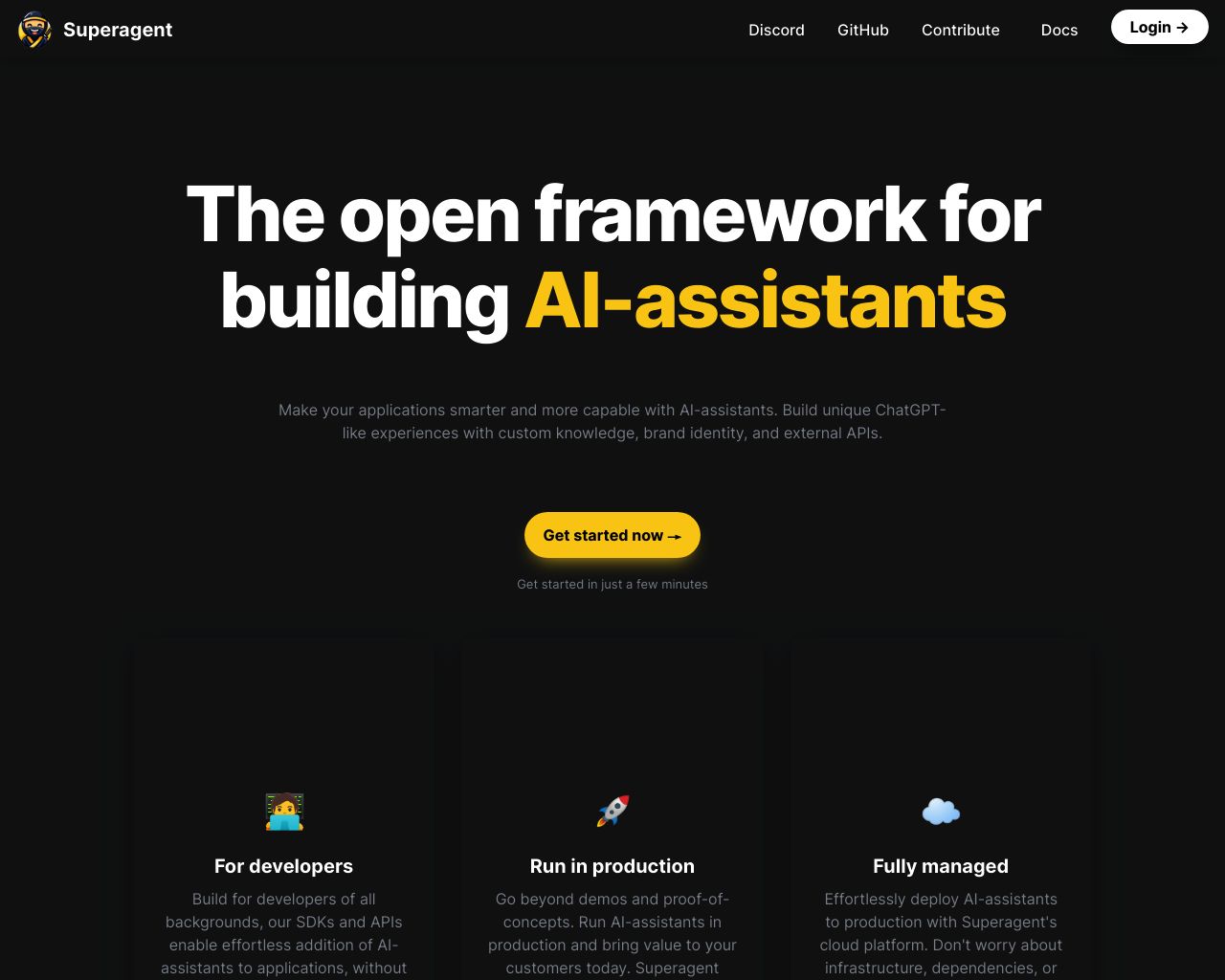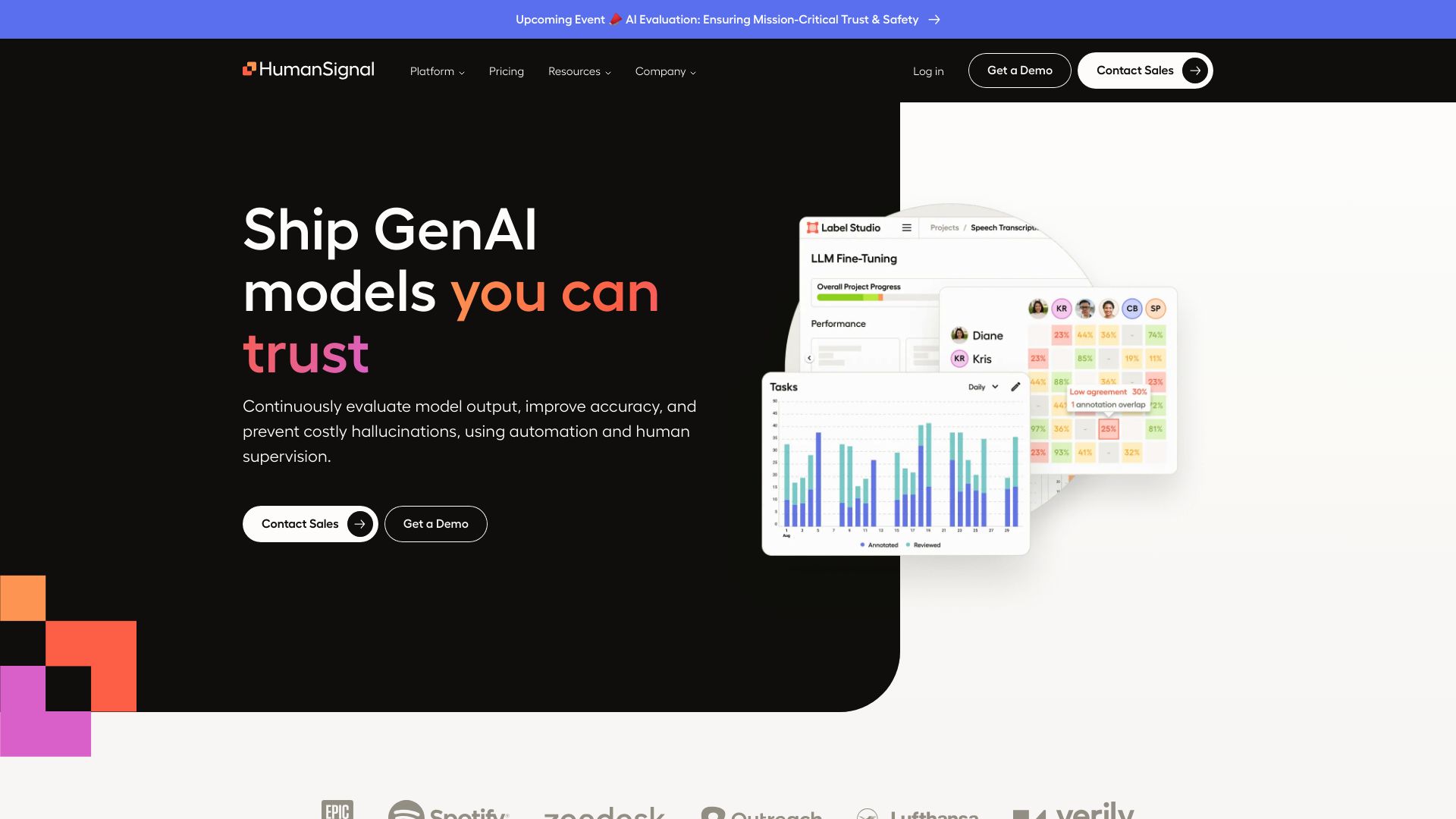Comparison between Superagent and Adala, and why SmythOS is favored over them.
AI agents revolutionize business operations, automating complex tasks and enhancing productivity across industries. Our comparison of Superagent, Adala, and SmythOS unveils the strengths and limitations of each platform in the AI agent development landscape. Superagent simplifies AI agent creation without extensive coding, while Adala specializes in autonomous data labeling. SmythOS emerges as a comprehensive solution, offering visual building tools, advanced security features, and multi-agent collaboration. This review equips developers, business leaders, and AI enthusiasts with insights to choose the ideal platform for their AI agent needs, balancing technical capabilities, ease of use, and scalability.
Superagent Overview
Superagent empowers developers to craft, deploy, and manage AI agents without extensive coding. This open-source platform simplifies the creation of autonomous agents for web research, sales automation, and project management.
The software stands out for its intuitive customization using simple markup, making AI agent development accessible to non-experts. Superagent integrates seamlessly with popular tools like Airtable and Salesforce, extending its utility across various business functions.
Superagent excels in automating complex tasks traditionally requiring significant manual effort. Its AI agents can independently browse the web, access files, and interact with diverse APIs, streamlining operations from sales prospecting to competitive analysis. This capability allows businesses to enhance efficiency, reduce operational costs, and maintain a competitive edge.
Superagent excels in automating complex tasks traditionally requiring significant manual effort. Its AI agents can independently browse the web, access files, and interact with diverse APIs….


While Superagent offers robust features, it lacks some advanced capabilities. The platform doesn’t provide a visual builder, which could limit accessibility for users who prefer graphical interfaces. Additionally, there’s no explicit support for multi-agent collaboration or advanced features like audit logs for analytics.
Superagent’s integration capabilities shine, offering connectivity with various APIs and external plugins. The platform supports deployment as a REST API, enhancing its versatility. However, it doesn’t offer deployment as a webhook or scheduled agent, which might restrict some automation scenarios.
Founded in 2023, Superagent aims to democratize AI usage across businesses. Its focus on simplicity and integration positions it as a valuable tool for companies seeking to leverage AI’s potential without deep technical expertise. However, users requiring advanced features like explainability tools or extensive collaboration features might find the platform limiting.
Adala Overview
Adala revolutionizes data labeling with its open-source framework for autonomous agents. Developed by HumanSignal, Adala streamlines the creation of AI-powered labeling assistants that learn and improve through interactions with ground truth datasets. These agents evolve into efficient prediction engines, capable of applying data labels to large, unlabeled datasets with increasing accuracy over time.
Adala revolutionizes data labeling with its open-source framework for autonomous agents… These agents evolve into efficient prediction engines, capable of applying data labels to large, unlabeled datasets with increasing accuracy over time.


Adala’s strength lies in its ability to combine human expertise with machine learning workflows. The platform supports multiple data types, including text, images, and video, making it versatile for various labeling tasks. Data scientists and AI researchers benefit from Adala’s flexibility, which allows for the fine-tuning of models through iterative labeling processes.
While Adala excels in automating data labeling, it lacks some features found in more comprehensive AI agent builders. The platform doesn’t offer a visual builder or explicit support for multi-agent collaboration. However, it compensates with robust integration capabilities, supporting various data sources and formats such as PDFs, Word documents, and text files.
Adala’s open-source nature fosters community-driven development and transparency. This approach aligns with HumanSignal’s mission to democratize data-centric AI, providing powerful tools to over 350,000 data scientists and experts worldwide. The platform’s emphasis on reducing bias through collaboration and automation at scale ensures that data labeling remains both efficient and accurate.
Adala’s open-source nature fosters community-driven development and transparency… providing powerful tools to over 350,000 data scientists and experts worldwide.
For organizations seeking to enhance their data labeling processes with AI, Adala offers a compelling solution. Its focus on autonomous learning and continuous improvement makes it particularly valuable for projects requiring large-scale, high-quality labeled datasets. However, users should consider their specific needs, as Adala’s specialized focus may not cover all aspects of general-purpose AI agent development.
Feature Comparison
Superagent and Adala offer distinct approaches to AI agent development, with notable differences in their core components and security features. Superagent provides a flexible platform for creating AI agents without extensive coding, while Adala focuses on autonomous data labeling.
In terms of core components, Superagent offers hosted agents for both development and production environments, allowing seamless deployment across different stages. However, it lacks a visual builder, which may limit accessibility for users preferring graphical interfaces. Adala, designed specifically for data labeling, likely offers more specialized tools for this purpose but may not provide the same breadth of general AI agent development features.
Regarding security, Superagent implements OAuth and IP control, enhancing access security for its AI agents. Adala’s security features are not explicitly detailed, which could be a concern for users handling sensitive data. Neither platform explicitly mentions advanced security measures like constrained alignment or comprehensive data encryption, which are crucial for enterprise-level deployments.
We offer a more comprehensive solution with our visual builder, advanced security features including constrained alignment and data encryption, and support for multi-agent collaboration. Our platform also provides audit logs for analytics and an agent work scheduler, features not explicitly mentioned by either Superagent or Adala. These capabilities ensure that our users can develop, deploy, and manage AI agents more effectively and securely across a wide range of applications.
Feature Comparison Table
| Superagent | Adala | SmythOS | |
|---|---|---|---|
| CORE FEATURES | |||
| Visual Builder | ❌ | ❌ | ✅ |
| No-Code Options | ✅ | ❌ | ✅ |
| Explainability & Transparency | ❌ | ✅ | ✅ |
| Audit Logs for Analytics | ❌ | ❌ | ✅ |
| SECURITY | |||
| Constrained Alignment | ❌ | ✅ | ✅ |
| IP Control | ✅ | ❌ | ✅ |
| COMPONENTS | |||
| Data Lakes | ❌ | ❌ | ✅ |
| DEPLOYMENT OPTIONS (EMBODIMENTS) | |||
| Staging Domains | ❌ | ❌ | ✅ |
| Production Domains | ✅ | ❌ | ✅ |
| Deploy as Scheduled Agent | ❌ | ❌ | ✅ |
| DATA LAKE SUPPORT | |||
| Sitemap Crawler | ✅ | ❌ | ✅ |
| YouTube Transcript Crawler | ✅ | ❌ | ✅ |
Best Alternative to Superagent and Adala
SmythOS stands out as the premier alternative to Superagent and Adala for AI agent development and deployment. Our platform offers a comprehensive solution that combines power, flexibility, and ease of use.
We provide a visual drag-and-drop interface that enables users to build complex AI workflows without extensive coding knowledge. This democratizes AI development, making it accessible to both technical and non-technical users alike. Unlike Superagent and Adala, our visual builder streamlines the creation process while still offering deep customization options for advanced users.
We provide a visual drag-and-drop interface that enables users to build complex AI workflows without extensive coding knowledge.
Our platform excels in its extensive integration capabilities. We support a wide array of AI models, APIs, and tools, allowing seamless connection to various data sources and services. This flexibility ensures that SmythOS can adapt to virtually any workflow or business process, surpassing the more limited options offered by Superagent and Adala.
Security and scalability set SmythOS apart. We implement advanced features like constrained alignment and comprehensive data encryption, addressing critical enterprise-level concerns that Superagent and Adala may not fully cover. Our platform also offers robust audit logs for analytics and an agent work scheduler, providing unparalleled control and insight into AI operations.
Security and scalability set SmythOS apart. We implement advanced features… addressing critical enterprise-level concerns that Superagent and Adala may not fully cover.
With SmythOS, users gain access to a versatile ecosystem for AI agent development. Our platform supports multi-agent collaboration, allows for various deployment options, and includes features like a hosted vector database and support for multiple file types. This comprehensive approach ensures that users can tackle a wider range of use cases and challenges compared to the more specialized focus of Superagent and Adala.
Conclusion
Superagent and Adala offer unique approaches to AI agent development and data labeling, respectively. Superagent’s strength lies in its ability to create customizable AI agents without extensive coding, making it accessible for businesses seeking to automate complex tasks. Adala, on the other hand, excels in autonomous data labeling, providing a specialized solution for data scientists and AI researchers working with large datasets.
While both platforms have their merits, they also have limitations. Superagent lacks a visual builder and advanced features like audit logs, which may restrict its usability for some users. Adala’s focused approach on data labeling might not cater to those seeking a more general-purpose AI agent development platform.
SmythOS emerges as a superior alternative, offering a comprehensive solution that addresses the limitations of both Superagent and Adala. Our platform features a visual builder, advanced security measures including constrained alignment and data encryption, and support for multi-agent collaboration. These capabilities, combined with our extensive integration ecosystem and versatile deployment options, make SmythOS the ideal choice for businesses looking to harness the full potential of AI agents.
For those ready to experience the future of AI agent development, we invite you to explore our diverse range of AI-powered agent templates. These templates cover multiple business categories and are designed to streamline processes across various functions. To get started with SmythOS and create your own AI agents, sign up for a free account today. With our risk-free trial and 30-day money-back guarantee, you can unleash the power of AI for your business without any commitment.
Last updated:
Disclaimer: The information presented in this article is for general informational purposes only and is provided as is. While we strive to keep the content up-to-date and accurate, we make no representations or warranties of any kind, express or implied, about the completeness, accuracy, reliability, suitability, or availability of the information contained in this article.
Any reliance you place on such information is strictly at your own risk. We reserve the right to make additions, deletions, or modifications to the contents of this article at any time without prior notice.
In no event will we be liable for any loss or damage including without limitation, indirect or consequential loss or damage, or any loss or damage whatsoever arising from loss of data, profits, or any other loss not specified herein arising out of, or in connection with, the use of this article.
Despite our best efforts, this article may contain oversights, errors, or omissions. If you notice any inaccuracies or have concerns about the content, please report them through our content feedback form. Your input helps us maintain the quality and reliability of our information.
